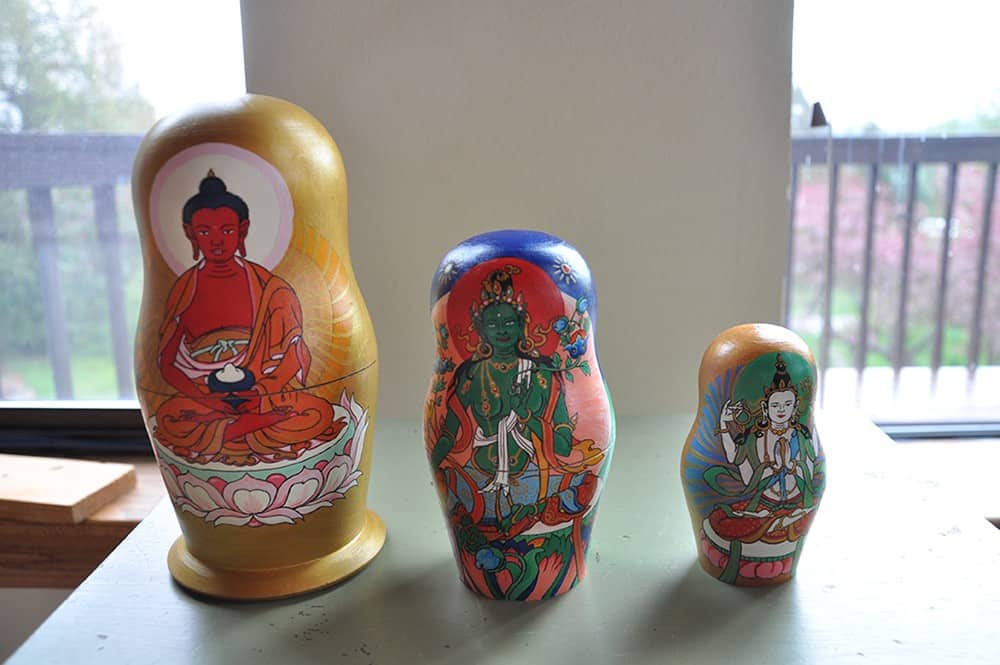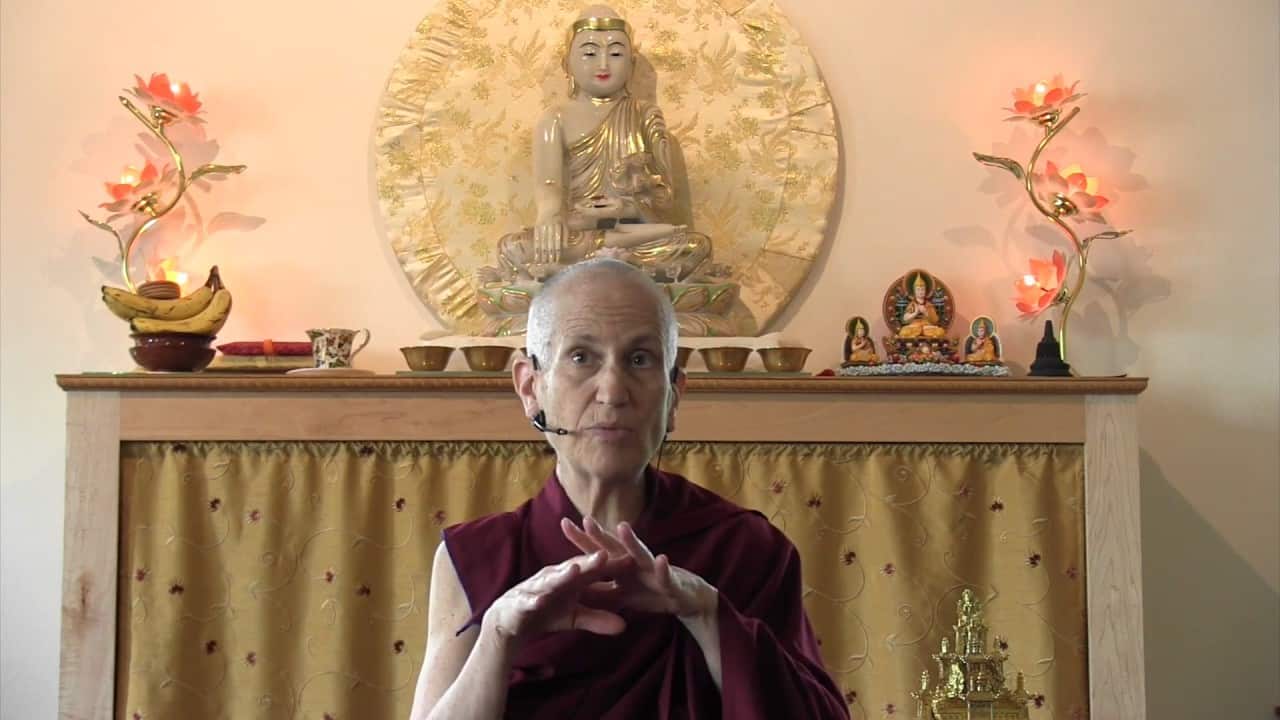Buddhist practice in the West
Venerable Lobsang Tenpa posed questions to Venerable Chodron during an interview in Moscow.
- What is the role of Buddhist monasticism in the West?
- Is there a simple practice we can do each day to give more meaning to our life?
- Why does The Dalai Lama want Buddhists to be familiar with all the major branches of Buddhism, not just their own?
- Have you seen progress in Dharma practitioners in Russia and what would be beneficial for them to do?
- Do you feel compassion should be a major force in human history at this point?
Interview of Venerable Chodron by Venerable Tenpa (download)
Venerable Lobsang Tenpa (LT): Venerable, could you please tell us what is the role of monasticism in Buddhism as it’s currently practiced in the West?
Venerable Thubten Chodron (VTC): Historically the establishment of the sangha, the monastic community, has been very important for the rooting of the Dharma in a culture and the spreading of the Dharma, and that’s because the monastic community lives in ethical precepts and because they form a community. There is a particular place where people in a society can look and say, “Oh, there are people who are cultivating love and compassion. There are people who are working on their minds.” So it gives the rest of society a lot of inspiration, to know that there’s a group where they can actually go and practice together with those people.
I think the monastic community sets an example for how to practice as well by living in ethical precepts, and it shows that living a simple lifestyle is possible and being happy with a simple lifestyle is possible. And I think especially now, when we’re facing environmental destruction and so on and lack of resources, cause we’re using up the resources, I think the example of the monastic community living a simple life without so many things, but still satisfied, is a very good example for the rest of society.
And then also historically, because the monastics don’t have families, they have more time to study, to practice, to teach others and so they are the chief ones responsible for preserving the Dharma and passing it onto the next generation.
So now in the West there are a lot of lay teachers, which is very good, and I think very helpful for people, and I think we need a balance of lay and monastic practitioners. But I think having a community does something that a lay family can’t do. Somebody’s upset, somebody needs spiritual counseling, you can’t knock on the door of your lay teacher’s house and say “I need help,” because they have a family and kids and everything; but when you need that help, you can go to a monastery. Somebody’s always going to be there and they’ll teach you and guide you.
So I think the role of monastics and monasteries is quite important, and we get letters from people all over the world thanking us for existing and just saying they’re so happy to know that there’s a monastery and people practice.
LT: Thank you so much. Our next question is that many people come to either Buddhism or secular mindfulness with a longing for a more meaningful life. Is there something simple and practical each of us can do on a daily basis so as to give deeper meaning to our existence?
VTC: I think the practice of the four immeasurables is the best thing people can do. The four immeasurables are developing love—the wish for others to have happiness and its causes; second, compassion—the wish for beings to be free of suffering and its causes; joy—the wish for others and self not to be separated from sorrowless bliss; and then equanimity—the ability to abide free of attachment and anger and bias and prejudice.
So in Buddhism there are four phrases that express those in a very short form, and I think reciting those on a daily basis and meditating on them is very very helpful. Even you don’t sit in formal meditation position,just sitting and developing those thoughts in your mind, especially at the beginning of the day, to help us set our motivation for the day,then that really turns our mind towards something good and it influences all of our relationships during the day.
Let me just recite the four immeasurables so the people know.
May all sentient beings have happiness and its causes.
May all sentient beings be free of suffering and its causes.
May all sentient beings never be separated from sorrowless bliss.
May all sentient beings abide in equanimity, free of bias, attachment and anger.
LT: Thank you so much. Our next question is this: Why does His Holiness the Dalai Lama want Buddhists to be familiar with all the major branches of Buddhism and not just their own?
VTC: His Holiness nowadays is talking a lot about us being “21st-century Buddhists” and one big element of that is stepping out and really getting to know the other Budddhist traditions with much better communication, because historically the different traditions have been separated geographically, they’ve been separated linguistically, but now, with modern transportation and IT, there’s the opportunity for people to meet each other and free ourselves from very old incorrect stereotypes about other Buddhist traditions.
And so I think His Holiness, in wanting people to know about other traditions, I think there’s several reasons there.
One is that it gives us the ability as a Buddhist community, a broad Buddhist community, to speak in one voice against violence, against human trafficking, against any kind of corruption, any kind of violation of human rights, anything that destroys the well-being of others. It gives us the ability to speak as one voice about climate change and the necessity to do something about it. So I think it brings Buddhists together in that way.
Also, as individual practitioners, when you learn about other traditions, it really helps your own practice.It really broadens and helps a great deal.
LT: Thank you so much. You first came and gave teachings here in Russia back in the 90s. So have you witnessed any progress with Dharma practice, and what in your opinion would be beneficial for Dharma practitioners here to do?
VTC: When I first came to Russia, it was in 1995-96, to teach, I was at some place in Moscow. They were asking me if I could read the future, if I saw flying saucers—you know, all this mystical magical stuff and of course all I had to say was “I don’t know, but I can explain to you how to develop love and compassion and wisdom,” but people were not so interested in that, they wanted mystical magical colorful things, which I couldn’t provide.
So, very fortunately, I see there’s a big change now, and what I found especially inspiring here in Russia is to see how many young people are interested in the Dharma and just people coming together—of all ages, but a lot of young people—and then volunteering, working together as a group, inviting teachers, practicing together, not just learning something, going back home and staying alone, but building a Buddhist community, and I think that’s really really wonderful.
LT: Thank you so much. And the last question is, you co-authored a book on compassion which is currently being translated into Russian and would then be openly released in both printed and electronic forms, so I’m wondering whether you feel that compassion should become a major driving force in human history at this point.
VTC: Yes, of course. Of course. And this is something His Holiness the Dalai Lama emphasizes too, because compassion gives meaning to our own lives personally and it creates peace in society, and without compassion, if we all are just looking out for ourselves, then we’re gonna destroy ourselves and everybody else, because we live in a interdependent world, so if just look out for ourselves, while the people around us suffer, then we’re gonna be surrounded by a lot of suffering people.
Suffering people will not stay quiet. They’re going to make noise, they’re going to let us know that they are suffering, and that creates turbulence in society. But if from the beginning we really take care of each other as human beings, because we all want to be happy, none of us want to suffer, then we prevent so many social problems. So many.
And it makes for a much more stable country. People’s minds being more stable, [we will have] better institutions in society. So I think compassion is absolutely necessary for our own individual well-being and the well-being of our own countries and the well-being of the world—because we’re so interrelated now, if we don’t care for each other, how are we going to exist together? We have to care for each other.
Venerable Thubten Chodron
Venerable Chodron emphasizes the practical application of Buddha’s teachings in our daily lives and is especially skilled at explaining them in ways easily understood and practiced by Westerners. She is well known for her warm, humorous, and lucid teachings. She was ordained as a Buddhist nun in 1977 by Kyabje Ling Rinpoche in Dharamsala, India, and in 1986 she received bhikshuni (full) ordination in Taiwan. Read her full bio.


